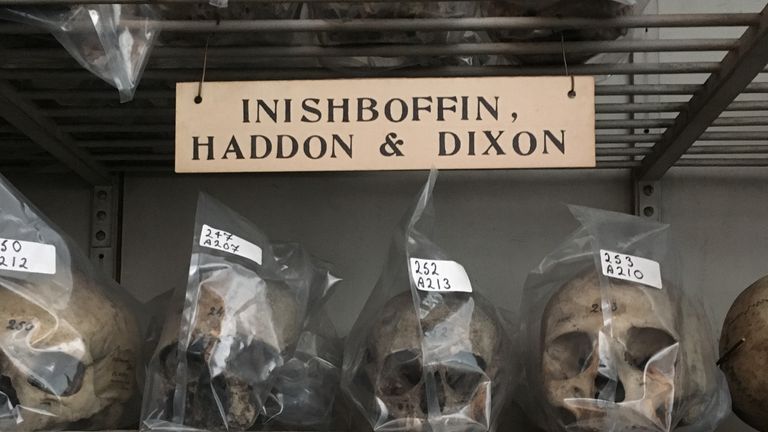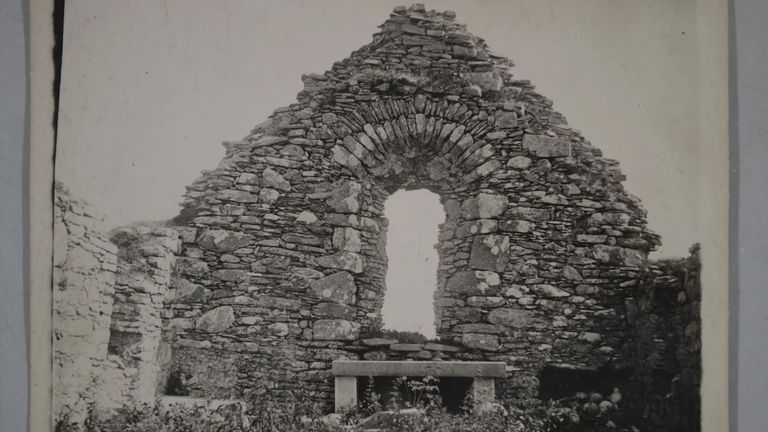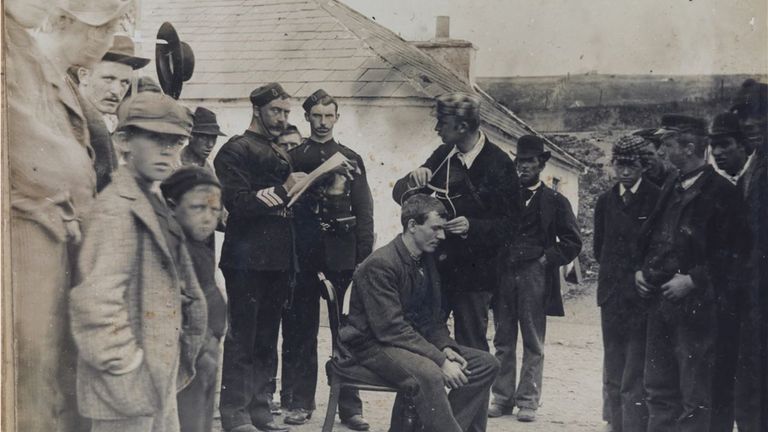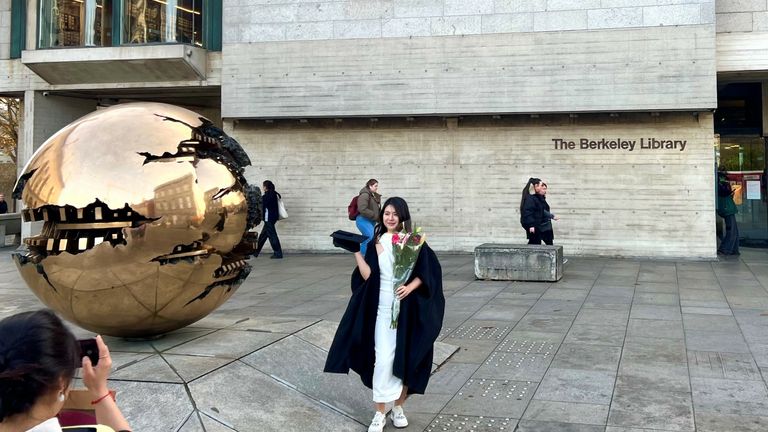Two men who smuggled the 13 skulls off Inishbofin island 132 years ago were affiliated with Ireland's oldest and most prestigious university, Trinity College Dublin.
Stephen Murphy
Ireland correspondent @SMurphyTV
Saturday 31 December 2022 01:57, UK

The stolen skull collection in Trinity College Dublin. Pic: Ciaran Walsh
When the two men crept into the ruined island monastery to steal human skulls under the cover of darkness, they knew what they were doing was wrong even by the ethical standards of 1890.
The raiders "lay low" at the sound of approaching travellers.
"When the coast was clear," Alfred Haddon later wrote, "we put our spoils in the sack."
But these were not common thieves, they regarded themselves as men of science.
Haddon was a British anthropologist and a fellow of the Royal College of Science. His accomplice in the skull-snatching was Irish medical student Andrew Dixon.
The pair smuggled the 13 skulls off Inishbofin island - an Atlantic-battered island off Ireland's west coast - by telling sailors their sack contained poitin, an Irish distilled spirit.
The men were affiliated with Ireland's oldest and most prestigious university, Trinity College Dublin (TCD), and the remains found their way to the university's collections.
When the two men crept into the ruined island monastery to steal human skulls under the cover of darkness, they knew what they were doing was wrong even by the ethical standards of 1890.
The raiders "lay low" at the sound of approaching travellers.
"When the coast was clear," Alfred Haddon later wrote, "we put our spoils in the sack."
But these were not common thieves, they regarded themselves as men of science.
Haddon was a British anthropologist and a fellow of the Royal College of Science. His accomplice in the skull-snatching was Irish medical student Andrew Dixon.
The pair smuggled the 13 skulls off Inishbofin island - an Atlantic-battered island off Ireland's west coast - by telling sailors their sack contained poitin, an Irish distilled spirit.
The men were affiliated with Ireland's oldest and most prestigious university, Trinity College Dublin (TCD), and the remains found their way to the university's collections.
'We want them to rest in peace'
One hundred and thirty two years later, the skulls are still locked away in Trinity's Old Anatomy Museum. Now, the islanders of Inishbofin are determined to get them back.
"We just want them home," says Marie Coyne, an Inishbofin historian and a vocal member of the island's campaign to have the remains repatriated.
"This is where they were stolen from," she tells Sky News, standing at the St Colman's site.
"That's a crime. We want our people's remains brought back to 'Bofin and we want to bury them here. And we want them to rest in peace."

One hundred and thirty two years later, the skulls are still locked away in Trinity's Old Anatomy Museum. Now, the islanders of Inishbofin are determined to get them back.
"We just want them home," says Marie Coyne, an Inishbofin historian and a vocal member of the island's campaign to have the remains repatriated.
"This is where they were stolen from," she tells Sky News, standing at the St Colman's site.
"That's a crime. We want our people's remains brought back to 'Bofin and we want to bury them here. And we want them to rest in peace."

St Colman's monastery on Inishbofin. Skulls are visible in bottom right corner.
Pic: Trinity College Dublin


St Colman's monastery today
TCD, which possesses 484 sets of human remains collected from around the globe in colonial times, does not dispute that the skulls were taken from Inishbofin illegally, and has set up a working group to try to tackle the "problematic legacies".
Those legacies also include the shadow of slavery.
TCD's main library is named after the famed Irish philosopher George Berkeley, a fellow at the university in the 1700s. He later moved to America, and the city of Berkeley, California, and its renowned university are both named in his honour.

TCD, which possesses 484 sets of human remains collected from around the globe in colonial times, does not dispute that the skulls were taken from Inishbofin illegally, and has set up a working group to try to tackle the "problematic legacies".
Those legacies also include the shadow of slavery.
TCD's main library is named after the famed Irish philosopher George Berkeley, a fellow at the university in the 1700s. He later moved to America, and the city of Berkeley, California, and its renowned university are both named in his honour.

An islander's skull being measured with a craniometer on Inishbofin in 1893.
Pic: Trinity College Dublin
However, records show that he also purchased at least four slaves to work on his Rhode Island plantation during the 1730s, and present-day students at Trinity are demanding that the Berkeley Library be de-named.
"I think Trinity as an institution should be embarrassed," says Gabi Fullam, president of the TCD Students' Union. "As a student, and somebody who goes to that library, I don't just find it embarrassing, I find it degrading."
'We're going to tackle this head-on'
Professor Eoin O'Sullivan is a senior dean at TCD and is leading the working group tackling the historical issues.
"I think it reflects an old university," he told Sky News, "and that there were practices in the university that from today's stance we wouldn't stand over, but were at the time perfectly explicable and understandable.
"I think the important thing is that Trinity are saying 'we're going to tackle this head-on'."

However, records show that he also purchased at least four slaves to work on his Rhode Island plantation during the 1730s, and present-day students at Trinity are demanding that the Berkeley Library be de-named.
"I think Trinity as an institution should be embarrassed," says Gabi Fullam, president of the TCD Students' Union. "As a student, and somebody who goes to that library, I don't just find it embarrassing, I find it degrading."
'We're going to tackle this head-on'
Professor Eoin O'Sullivan is a senior dean at TCD and is leading the working group tackling the historical issues.
"I think it reflects an old university," he told Sky News, "and that there were practices in the university that from today's stance we wouldn't stand over, but were at the time perfectly explicable and understandable.
"I think the important thing is that Trinity are saying 'we're going to tackle this head-on'."

The Berkeley Library at Trinity College Dublin, named after slave-owner George Berkeley
In a statement, TCD said its board has decided to "work with the people of Inishbofin and the statutory authorities to find a solution that respects the wishes of the islanders."
It is still taking submissions from the public on the separate Berkeley Library issue until January.
Other legacy issues
TCD, created in 1592 by Queen Elizabeth's royal charter and an important tourist attraction in Dublin, is by no means the only university or museum grappling with legacy issues.
University College Cork announced in September that it is to repatriate ancient mummified human remains to Egypt. In Northern Ireland, the Ulster Museum recently returned human remains and other sacred objects to Hawaii.
In the UK, the University of Cambridge is making plans to return more than 100 Benin bronzes stolen from Nigeria, while the British Museum is under continued pressure from Greece to hand back the famous Parthenon marbles.
Back on Inishbofin, the wider international picture seems irrelevant. For the islanders, the injustice is black and white and so therefore is the solution.
"The skulls were stolen from here," says Ms Coyne, "and they need to come back here. They need to come home."
In a statement, TCD said its board has decided to "work with the people of Inishbofin and the statutory authorities to find a solution that respects the wishes of the islanders."
It is still taking submissions from the public on the separate Berkeley Library issue until January.
Other legacy issues
TCD, created in 1592 by Queen Elizabeth's royal charter and an important tourist attraction in Dublin, is by no means the only university or museum grappling with legacy issues.
University College Cork announced in September that it is to repatriate ancient mummified human remains to Egypt. In Northern Ireland, the Ulster Museum recently returned human remains and other sacred objects to Hawaii.
In the UK, the University of Cambridge is making plans to return more than 100 Benin bronzes stolen from Nigeria, while the British Museum is under continued pressure from Greece to hand back the famous Parthenon marbles.
Back on Inishbofin, the wider international picture seems irrelevant. For the islanders, the injustice is black and white and so therefore is the solution.
"The skulls were stolen from here," says Ms Coyne, "and they need to come back here. They need to come home."
No comments:
Post a Comment